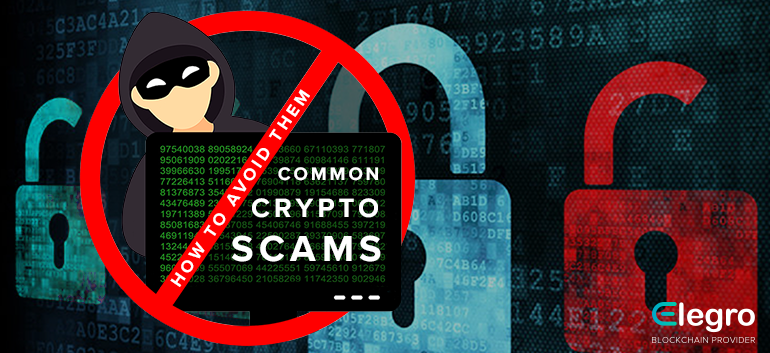Common Crypto Scams: How To Avoid Them

For many people, cryptocurrency has become a customary form of money. Still, there are many newcomers who are only starting to explore the crypto space. They view the crypto market as a gold mine to make a fortune. Being blinded with a thirst for gain they fall victims of crypto fraudsters and scams. As a result, instead of becoming rich, they lose everything.
To avoid crypto scammers’ traps, you need to learn more about the way they work. Here we give you some tips on how to avoid crypto fraud. Who is forewarned, that is forearmed.
Mining scams
The user gets a profitable offer to send coins to a certain company. The latter convincingly promises to earn great money for the person. As soon as the investor sends money, phoney company disappears with all the money.
Thus, in April 2018, Bharvadj brothers were arrested in India. They were the founders of some crypto projects including GainBitcoin and the country’s first Bitcoin mining company GBMiners. Authorities accused them of stealing investments for $300 million. Brothers applied a Ponzi scheme to fool users guaranteeing them 10% monthly income during 3 years.
How to recognize mining scams:
- Most mining companies accept Bitcoin, PayPal and credit cards. If a company accepts only Bitcoin, there is a great possibility of scam. The reason is you can’t cancel payments in Bitcoin.
- The company offering free trial versions especially at the request of payment information is most likely a fraudster.
- The use of Ponzi scheme.

Fake wallets
As soon as a user accesses such a wallet and deposits funds there, all money disappears. Very often fake wallet names are similar to real. Let’s take the example of Electrum Pro which copied the name of a real wallet Electrum. Scammers often use not only fake wallets but also they steal real wallets’ login credentials. For example, through the fake wallet on the site Mybtgwallet.com scammers stole private keys of clients. As a result, they lost $3.3 million.
What to do:
- Use only official wallets and download them from project’s websites.
- To store crypto funds long-term use a hardware wallet but make sure you’ve bought it from an official representative.
Fake exchanges
Most people couldn’t even guess that during exchanges or storing of crypto at the exchange they actually stop being their funds managers. Scammers often create their fake exchanges or hack real ones to steal clients’ money.
Recently a massive hacker attack happened in Japan. A large exchange Coincheck was hacked. Hackers managed to steal about $532 million.
What to do
- Use the services of licensed payment service providers;
- Thoroughly study the exchange or wallet before to make an account there.
- Never deposit coins or provide personal information till you know it’s safe.
And, finally, here is the most important advice: be cautious and attentive when it comes to investments. Crypto scammers can be very inventive and merciless.

Comments